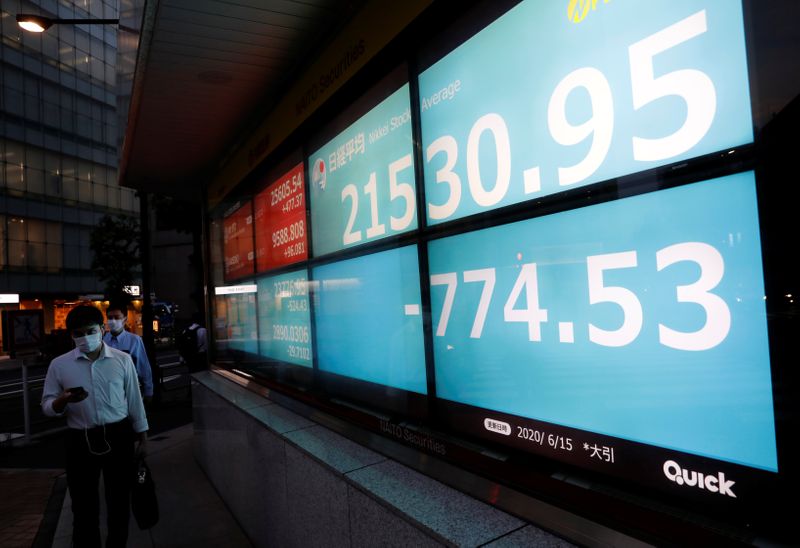By Ritvik Carvalho
LONDON (Reuters) - Global stock markets rallied to four-week highs on Monday as investors counted on a revival in Chinese activity to boost global growth, even as surging coronavirus cases delayed business re-openings across the United States.
MSCI's All-Country World Index (MIWD00000PUS), which tracks shares across 49 countries, rose 0.7% to its highest since June 6 after the start of European trading.
European shares jumped, with the pan-European STOXX 600 index rising 1.64%. Stocks exposed to China, like carmakers (SXAP), industrials (SXNP), energy firms (SXEP) and luxury goods makers rose strongly, while banks (SX7P) also rallied.
In Asia, MSCI's broadest index of Asia-Pacific shares outside Japan (MIAPJ0000PUS) climbed 1.6% to its highest since February, with the bullish sentiment spilling into other markets.
E-Mini futures for the S&P 500 (ESc1) firmed 1.2%.
Chinese blue chips (CSI300) jumped 5.7% on top of a 7% gain last week to their loftiest level in five years. Even Japan's Nikkei (N225), which has lagged with a soft domestic economy, managed a rise of 1.8%.
Among the reasons investors cited for the buying was improving economic data - UBS noted Citi's Economic Surprise Index for the U.S. has risen to its highest level on record. The index measures how well economic data releases are faring relative to consensus forecasts.
Some cited an editorial in the China Securities Journal, which said on Monday that China needed a bull market to help fund its rapidly developing digital economy.
"We advise against regarding uncertainty as a reason for exiting markets. Instead, we see ways for investors to cope with uncertainty - including averaging into markets - or even take advantage of volatility," said Mark Haefele, chief investment officer at UBS Global Wealth Management.
In Hong Kong, Jefferies chief global equity strategist Sean Darby said the positive sentiment towards Asian markets was the result of better than expected regional economic data and elevated liquidity levels.
"All of the global monetary policy indicators are flashing green right now. It is very loose and that should mean markets which have underperformed should do well," Darby told Reuters.
"The dollar has also been weaker over the past five days so emerging markets, led by China, normally do well on that back of that."
Most markets gained ground last week as a raft of economic data from June beat expectations, although the resurgence of coronavirus cases in the United States is clouding the future.
In the first four days of July alone, 15 states have reported record increases in new cases of COVID-19, which has infected nearly 3 million Americans and killed about 130,000, according to a Reuters tally.
Analysts estimate that reopenings affecting 40% of the U.S. population have now been wound back.
"Markets will have to climb a wall of worry in July as economic activity likely softens from the V-shaped recovery seen over recent months," said Robert Rennie, head of financial market strategy at Westpac.
"We must remember too that U.S. and China relations are deteriorating noticeably."
Two U.S. aircraft carriers conducted exercises in the disputed South China Sea on Saturday, the U.S. Navy said, as China also carried out military drills that have been criticised by the Pentagon and neighbouring states.
The risks, combined with unceasing stimulus from central banks, have kept sovereign bonds supported in the face of better economic data. While U.S. 10-year yields (US10YT=RR) edged up to 0.7% on Monday, well off the June top of 0.959%.
Germany's benchmark 10-year Bund yield edged up, pulling further away from recent five-week lows in the face of rallying equity markets.
Analysts at Citi estimate global central banks are likely to buy $6 trillion of financial assets over the next 12 months, more than twice the previous peak.
Major currencies have been largely rangebound with the dollar index down 0.3% at 96.894 (=USD), having spent an entire month in a snug band of 95.714 to 97.808.
The dollar was a shade firmer on the yen at 107.57
In commodity markets, gold has benefited from super-low interest rates across the globe as negative real yields for many bonds make the non-interest paying metal more attractive.
Spot gold traded at $1,776.21 per ounce
Oil prices were mixed with Brent crude (LCOc1) futures up 1.87% at $43.58 a barrel, while U.S. crude (CLc1) gained 0.84% to $40.99 amid worries the surge in U.S. coronavirus cases would curb fuel demand.
($1 = 7.0429 yuan)
